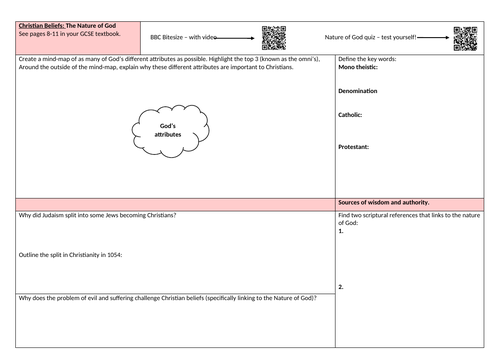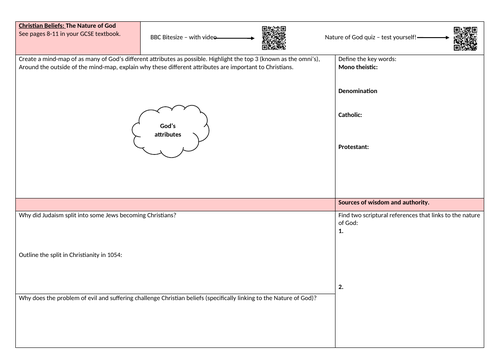
61Uploads
5k+Views
1k+Downloads
Religious education

KS3 Hinduism - Dharma, karma, samsara and moksha - 2 lessons.
This is a two-part lesson focusing on core beliefs about morals, life and life after death in Hinduism. It is the third and fourth lesson in a unit, but can be used separately, adaptable where necessary.

KS3/KS4 Philosophy - Bentham and Mill - Utilitarianism
This is a KS3 lesson on utilitarianism, focusing on Jeremy Bentham and John Stuart Mill. This could also be used for core KS4.

Christianity - Judgement and the afterlife
This is a KS4 lesson on Christianity and the afterlife including exam style practice ad a starter and a plenary. Short video embedded of a simple breakdown of the parable of the sheep and goats and creative activity with teacher example to boost confidence of pupils to create their own.

KS3/4 Religion vs Science
This is a lesson based on some key thinkers in the religion vs science debate. The main focus is on two elements - religion and science are enemies, or, religion and science can work together and compliment one another. It uses Darwin and Behe and has a choice of two plenaries depending if you wished to do this over one or two lessons. If it was over two, there would be opportunity for an ending debate with teams to present against eachothers view.

KS3 Philosophy of religion - Plato
This is the second lesson in a sequence of philosophy lessons for KS3 - specifically year 8 but can easily be used for year 9 with little adaption. This also works for a stand alone lesson which is not reliant on the sequence. I am currently working on this unit and it will soon be complete and all available as either singular lessons or as a unit bundle. This lesson focuses on Plato, his theory of Forms and the allegory of the cave.

KS3/4 Philosophy unit - 7 lessons.
This is a bundle of seven of my philosophy lessons, including a knowledge bank - at a reduced rate. This unit includes lessons:
Ultimate questions
Plato
St Thomas Aquinas
Blaise Pascal
William Paley
Ludwig Feuerbach
Jean Paul Sartre
Plus a knowledge bank.

KS3 Hindu festivals
This is the fifth lesson in a unit (but can be used as a standalone - adapted minimally where necessary) based on Hindu festivals. Key focus is Diwali and Raksha Bandhan.

KS3 Hinduism gods and goddesses
The second lesson in a unit (can also be used as a standalone) focused on Hindu gods and goddesses. Looks at the development from polytheism to monotheism for most modern Hindus.

KS3 introduction to philosophy and ultimate questions
This is a lesson aimed at KS3, specifically year 8 but would easily work for year 9 with maybe a little adapting. The lesson introduces philosophy through investigating ultimate questions. This is an opening lesson to a 10 lesson unit (made up of 8 lessons, with a revision lesson and an assessment lesson).
This unit is soon to be complete and all will be uploaded as individual lessons but also as an entire unit. This is for religious studies.

KS4 AQA GCSE Religious studies Islamic practices - Festivals
This is a lesson on Islamic festivals which follows the AQA spec. It includes information, news report video, questioning, exam practice and challenge activities.

KS4 GCSE AQA Religious studies Islamic beliefs - Ibrahim (1.8)
This is a lesson about Ibrahim and his role within Islam. It follows the AQA spec and includes information, links, questioning and a video with supporting A3 printout for the completion of a 9-part flow chart about Ibrahim.

KS3/4 Medical Ethics unit of work
This is a unit on medical ethics, including religious perspectives. The unit includes 6 x 1 hour lessons with all handouts/printing documents, with plenty of opportunity for discussion and debate. It also includes an A4 knowledge bank that covers all key aspects, for the purpose of revision and summary, should you wish to have an end of unit assessment (assessment not included). The lesson titles are:
Medical ethics introduction
Blood and organ donation (NHS campaign, law changes, general information, Jehovahs Witnesses’)
Quality of life (Health related and non-health related, case study on dementia patients, case study on doll therapy for QoL for dentia patients, sanctity of life)
Euthanasia (Sanctity of life, types of euthanasia and the legal implications, Christian and Islamic perspectives)
Abortion (When does life begin, pro-life view, pro-choice view, Roman Catholic perspective, Wade vs Roe debate and law changes which include two sensitive case studies of women denied necessary medical abortions since the laws have changed)
Capital punishment (Derek Bentley case study, careers affected if capital punishment was legalised in the UK , e.g, doctors, pharmacists, police.

KS3/4 Medical ethics abortion lesson 5
This lesson focuses on abortion and medical ethics. Covering Pro life and Pro choice views, including Roman Catholic. This leads to looking at the over turning of Wade vs Roe with two emotional case studies of women who have suffered since state laws have changed.

KS3/KS4 Medical ethics and capital punishment - lesson 6
This lesson is the final lesson of the unit, but can be used as a standalone lesson. The focus is capital punishment from a medical ethic perspective. Including a case study on Derek Bentley and the logistics in making it legal (professions that would have to agree to it) - Draws on Christian medical professionals and the sanctity of life.

KS3 Philosophy of religions St Thomas Aquinas
This is a KS3 resource, aimed at year 8 but could easily be used for year 9 with little adaption. This is the third lessons in the unit but could be used as a stand alone lesson as it does not rely on the previous two lessons. This unit is currently underway and will be complete shortly where all resources will be available as singular lessons but also as a unit bundle. This lesson focuses on St. Thomas Aquinas and his First Cause argument.

KS4 AQA GCSE Religious studies Christian beliefs revision pack
This is an 8 page revision pack for AQA GCSE Religious studies Christian beliefs. It brings together the unit into its most vital information, including sources of authority, diagrams, questioning that allows for different perspectives with some supporting images where helpful. Each page includes where the information is located withing the GCSE AQA Christianity textbook, and a QR code linked to a variety of resources, such as; quizzes, information, practice exam questions, videoes and flashcards.

KS4 GCSE AQA Religious studies Christian beliefs and practices revision packs
This is an 8 page revision pack for AQA GCSE Religious studies Christian beliefs and an 11 page revision pack for AQA GCSE Religious stidies Christian practices. It brings together the unit into its most vital information, including sources of authority, diagrams, questioning that allows for different perspectives with some supporting images where helpful. Each page includes where the information is located withing the GCSE AQA Christianity textbook, and a QR code linked to a variety of resources, such as; quizzes, information, practice exam questions, videoes and flashcards.

KS4 GCSE AQA Religious studies Theme A - Relationships and families - Contraception (3.3)
This lesson follows the Theme A curriculum, focusing on contraception and family planning for both Christians and Muslims. It includes links, scripture, exam practice and recall to 3.2.

KS3/KS4 core - The life of Siddhartha Gautama - Buddhism lesson 2
This is a lesson that focuses on the life of Sidddhartha before he left the palace. This includes The Four Sights, linking it to privilege within society and the feelings of students - Including questioning and challenge material and also some recall from lesson 1 (if you are using it, you can run this as a standalone lesson, the only thing that would need adapting is the plenary).

Medical ethics and religion - lesson 2 - Blood and organ donation
This is the second lesson in a 6 lesson unit based on different medical ethical dilemmas, which are applied to everyday life, whilst incorporating religion, this lesson specifically applies the issue to Jehovah’s Witnesses’. This includes a printed reading, both a standard version, and a highlighted version to help EAL students depict the key sentences.




















